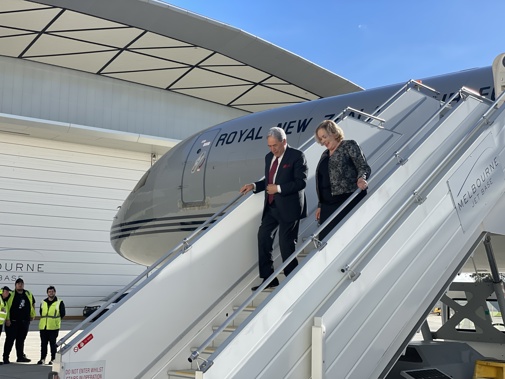
Avoiding commitment to Aukus, boosting defence spending and considering transtasman roles in the Ukraine and Middle-Eastern conflicts must all be on the table during meetings between Australian and New Zealand officials, an international expert claims.
Foreign Minister Winston Peters and Defence Minister Judith Collins touched down in Melbourne yesterday on their whistle-stop tour of Australia. They disembarked at about 7pm on Wednesday, NZ time.
Today they are meeting their Australian counterparts, Foreign Minister Penny Wong and Defence Minister Richard Marles.
Talking to The Mike Hosking Breakfast this morning, Collins was asked where conversations would begin between the two sets of officials and she said the Pacific must be the main area of concern.
"New Zealand and Australia clearly have a responsibility to our Pacific neighbours but also to ourselves," she said.
"And, clearly, the defence and the interest of New Zealand are always going to come first for us, and we have one ally and that is Australia - so they're good friends and our ally, and we'll be working a lot more closely with them."
According to international relations expert Robert Patman, there needs to be a significant focus on discussions over Aukus - a security partnership between Australia, the United Kingdom and the United States.
Collins, when asked about Aukus and whether it would be covered in the meetings, said there wasn't much detail over the second pillar and it needed to be understood.
"The parties themselves ... are still working through what the opportunity might be for a country like ourselves and our other friend," she told Hosking.
"So it is important we talk about that today, but I think we'll also be talking about some of the threats in the region and the opportunities for us to work together."
Patman said New Zealand officials needed to avoid committing themselves to Aukus as they seek to learn more about what is entailed in participating in the agreement.
"It is interesting that there is now real push-back against Aukus in Canberra from some senior members of the military and public service," he told ZB Plus.
"Sam Roggeveen, who works for the Lowy Institute, recently wrote a withering critique of Australia’s participation in Aukus in a book called The Echidna Strategy. [He] argues that Aukus is ridiculously expensive and ‘places too many Australian eggs in the American basket’."
According to Patman, the meeting had other desirable outcomes - starting with New Zealand needing to "start to walk the talk" and commit itself to boosting defence spending.
He said it should equate to roughly 1.5 per cent of the country's GDP and make this commitment independent of the Aukus question.
Patman also believed New Zealand and Australia should discuss calling on the US to think again about its unconditional support for Israel's "disproportionate and 'indiscriminate' military assault on Gaza".
"New Zealand and Australia should declare their support for an immediate humanitarian ceasefire and support the efforts of the UN Secretary-General in this regard," he said.
Finally, Patman believed Zealand needed to follow the example of Australia to work harder in its support for Ukraine, as it tries to eject Russian invading forces from its country.
He described New Zealand's support for Zelensky’s government to date as modest.
"NZ and Australia should re-affirm their support for an international rules-based order and therefore indicate they will oppose any effort by China or any other external actor to impose their own geo-political agenda on this region," he said.
"The number one security issue for the Pacific Island states is the existential threat of climate change and NZ and Australia should emphasise that their priority is to help Pacific Island states ameliorate this threat."
Take your Radio, Podcasts and Music with you









